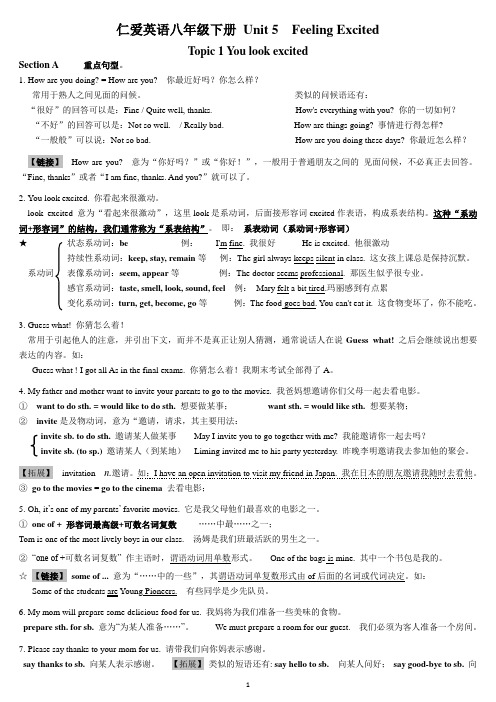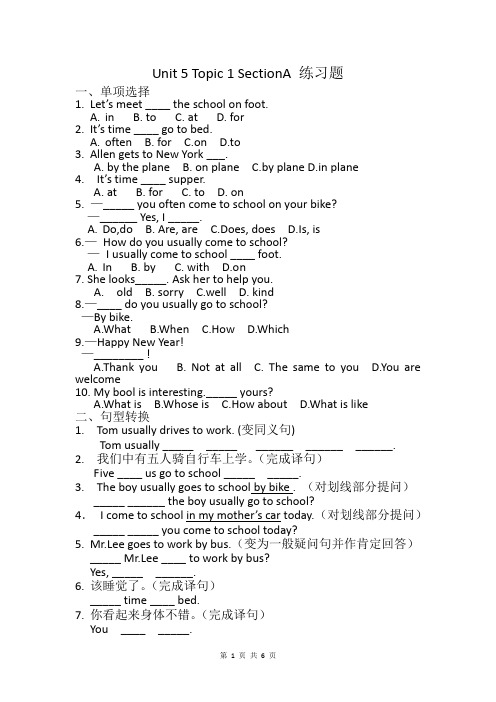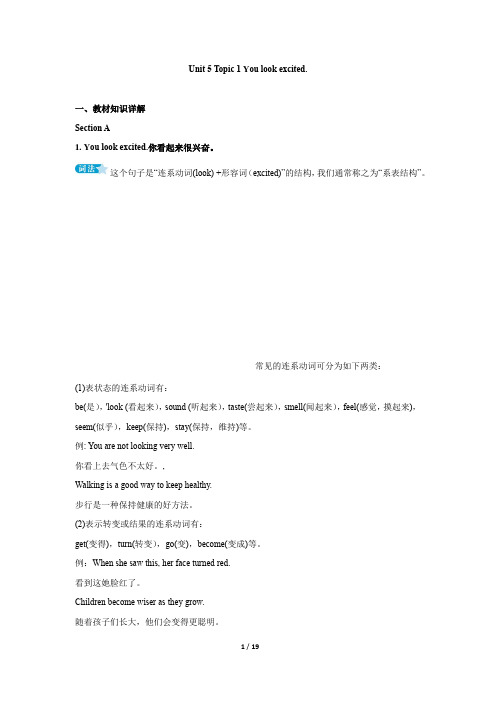Unit 5 Topic 1 Section C
仁爱版八年级英语下册Unit-5 topic 1 重点知识点总结

仁爱英语八年级下册Unit 5 Feeling ExcitedTopic 1 You look excitedSection A 重点句型。
1.How are you doing? = How are you? 你最近好吗?你怎么样?常用于熟人之间见面的问候。
类似的问候语还有:“很好”的回答可以是:Fine / Quite well, thanks. How's everything with you? 你的一切如何?“不好”的回答可以是:Not so well. / Really bad. How are things going? 事情进行得怎样?“一般般”可以说:Not so bad. How are you doing these days? 你最近怎么样?【链接】How are you? 意为“你好吗?”或“你好!”,一般用于普通朋友之间的见面问候,不必真正去回答。
“Fine, thanks”或者“I am fine, thanks. And you?”就可以了。
2.You look excited. 你看起来很激动。
look excited 意为“看起来很激动”,这里look是系动词,后面接形容词excited作表语,构成系表结构。
这种“系动词+形容词”的结构,我们通常称为“系表结构”。
即:系表动词(系动词+形容词)★状态系动词:be 例:I'm fine. 我很好He is excited. 他很激动持续性系动词:keep, stay, remain等例:The girl always keeps silent in class. 这女孩上课总是保持沉默。
系动词表像系动词:seem, appear等例:The doctor seems professional. 那医生似乎很专业。
感官系动词:taste, smell, look, sound, feel 例:Mary felt a bit tired.玛丽感到有点累变化系动词:turn, get, become, go等例:The food goes bad. You can't eat it. 这食物变坏了,你不能吃。
仁爱英语七年级下册Unit5 Topic1 SectionC 随堂练习

Unit5 Topic1 SectionC 随堂练习一、用方框中所给词的适当形式填空。
1. Many books are in the ______. I often borrow them there after class.2. —How often does Miss Li go shopping?—______ a week.3. It’s 9:00 p. m. It’s time to go to ______.4. Fourteen days are two ______.5. Lunch ______ at eleven thirty. Let’s go now.二、单项选择1. ____ do you watch TV?—Three times a week.A. How longB. How oftenC. How many timesD. How much2. The woman ____ takes the subway home.A. some timeB. some timesC. sometimesD. sometime3. He can’t speak French, so he ____ speaks French.A. seldomB. oftenC. sometimesD. never4. —What does Jane do after school?—She often ____.A. plays the basketballB. plays basketballC. plays the guitarD. plays guitar5. —Do you often _______ after dinner?—Yes, I do.A. see a movieB. look at TVC. play computer gameD. read book三、用所给单词的适当形式填空Xiao Min usually gets up at seven o’clock. He has breakfast at half past seven and then 1 to school. Classes 2 at eight o’clock in the morning and finish (结束)at threeo'clock in the afternoon. 3 school, Xiao Min usually plays games with his classmates. At about half past six, he has dinner with his family. Then he 4 TV for a short time. In the evening he reads books or 5 to music. He goes to bed at half past nine.1. ____2. ____3. ____4. ____5. ____四、根据汉语提示完成句子。
仁爱英语七年级下Unit-5-Topic1-练习题 (1)

Unit 5 Topic 1 SectionA 练习题一、单项选择1.Let’s meet ____ the school on foot.A.inB. toC. atD. for2.It’s time ____ go to bed.A.oftenB. forC.onD.to3.Allen gets to New York ___.A. by the planeB. on planeC.by planeD.in plane4. It’s time ____ supper.A. atB. forC. toD. on5. —_____ you often come to school on your bike?—______ Yes, I _____.A.Do,doB. Are, areC.Does, doesD.Is, is6.—How do you usually come to school?—I usually come to school ____ foot.A.InB. byC. withD.on7. She looks_____. Ask her to help you.A. oldB. sorryC.wellD. kind8.—____ do you usually go to school?—By bike.A.WhatB.WhenC.HowD.Which9.—Happy New Year!—________ !A.Thank youB. Not at allC. The same to youD.You are welcome10. My bool is interesting._____ yours?A.What isB.Whose isC.How aboutD.What is like二、句型转换1. Tom usually drives to work. (变同义句)Tom usually _____ _____ ______ ______ ______.2. 我们中有五人骑自行车上学。
七年级英语(仁爱版)下册 Unit-5-Topic-1 知识点总结语言点归纳

知识点七年级英语(仁爱版)下册Unit-5-Topic-1语言点归纳Unit 5 Topic 1I 重点词汇和短语gate, by, always, plane, train, ship, boat, Ms., grandmother, group, weekday, early, bird, catch, seldom, walk, never, sometimes, ride, park, watch, TV, homework, life, American, or, few, day, rest, play, basketball, swim, ball, game, read, listen, library, once, twice, week, every, must, first, music, begin, while, wall, bed.the same to, come on, on foot, by plane, know about, for a while, watch TV, do (one’s) homework, have lunch, at school, have a rest, be different from, go swimming, listen to, go to bed, go to school, have classes.II 语言点Section A1. a) ---Happy New Year! ---- The same to you! / You, too. 新年快乐!也祝你新年快乐!b) ----Happy birthday! -----Thank you! 生日快乐!谢谢!2. How about you? = What about you? 你怎么样?3. Oh, your new bike looks very nice! 哦,你的新自行车看起来很好看。
仁爱版英语八下 Unit 5 Topic 1 重点知识点总结

Unit 5 Topic 1 Y ou look excited.一、教材知识详解Section A1. Y ou look excited.你看起来很兴奋。
这个句子是“连系动词(look) +形容词(excited)”的结构,我们通常称之为“系表结构”。
常见的连系动词可分为如下两类:(1)表状态的连系动词有:be(是),'look (看起来),sound (听起来),taste(尝起来),smell(闻起来),feel(感觉,摸起来),seem(似乎),keep(保持),stay(保持,维持)等。
例: You are not looking very well.你看上去气色不太好。
,Walking is a good way to keep healthy.步行是一种保持健康的好方法。
(2)表示转变或结果的连系动词有:get(变得),turn(转变),go(变),become(变成)等。
例:When she saw this, her face turned red.看到这她脸红了。
Children become wiser as they grow.随着孩子们长大,他们会变得更聪明。
2. My father and mother want to invite your parents to go to the movies.我父母想邀请你父母一起去看电影。
invite vt.邀请。
固定短语:invite sb.to do sth/to somewhere例:He invites us to his restaurant. = He invites us to go to his restaurant.他邀请我们去他的餐馆。
go to the movies = go to the cinema 去看电影invitation n.邀请。
例:I have an open invitation to visit my friend in Japan.我在日本的朋友邀请我随时去看他。
仁爱英语 九年级上册unit 5 topic 1 课文翻译

Unit5Topic1课文翻译SectionA-1aSusanna:Mom, how much do you know about China?苏珊娜:妈妈,关于中国你了解多少?Mrs. Green:A lot. China is a great country that has about 5000 years of history. There are many places of interestwhich attract millions of tourists from all over the world every year.格林太太:很多。
中国是一个有着大约 5000 年历史的国家。
这里有许多景点,每年都能吸引全世界数百万的游客。
Susanna:Is that so? Are there any beautiful mountains?苏珊娜:是吗?那里有什么好看的山峰吗?Mrs. Green:Yes. And some of them are very famous, such as Mount Tai, Mount Huang, Mount Song and Mount Emei.格林太太:有。
其中有些非常出名,比如泰山、黄山、嵩山和峨眉山。
Susanna:What about rivers?苏珊娜:那有大河吗?Mrs. Green:There are a great number of rivers in China. Among them, the Changjiang River is the longest one and thesecond longest is the Huanghe River. They're the birthplaces of Chinese culture.格林太太:中国有许多大河。
其中,长江是第一长河,黄河是第二长河。
它们都是中国文化的发源地。
八年级英语下册Unit5FeelingexcitedTopic1YoulookexcitedSectionC教案仁爱版

Unit 5 Feeling ExcitedTopic 1 You look excited.Section C一、教材分析本节课主要活动为Section C。
1a呈现了在前两课中多次提到的音乐剧The Sound of Music的故事梗概。
在Pre-reading环节利用师生讨论电影片段的方式让学生了解电影的故事情节。
并在这个过程中教师有意运用本课出现的新词汇和新短语,并加以解释,为理解课文扫清语言障碍。
While-reading环节由浅入深进行阅读。
第一遍了解课文大意。
第二遍疏通文意,完成1c的问答。
第三遍细读文章,完成表格并提醒学生注意系表结构在文章中的多次运用。
Post-reading环节旨在进行语言的输出训练。
在复述课文的基础上将课文改写成对话加以巩固。
二、教学目标1. 学习并掌握新词汇:lonely, lively, almost, care for, cheer up, mainly2. 学生能正确运用“linking verb+ adjective”结构造句,掌握because和because of 的区别以及cheer sb up, cheer sb on, care for, lonely等相关短语。
3. 学生能在表格的帮助下复述本课课文,简单地介绍影片大意。
4. 能听懂本课文本材料以及与电影内容相关的课堂用语。
5. 能熟练地口头谈论有关The Sound of Music的故事大意及经典音乐的话题。
6. 能准确朗读课本的文本材料,并能正确地朗读相关的文本材料。
7. 能规范地写出有关采访Mr. Brown关于The Sound of Music的对话。
8. 教育学生要热爱音乐,学会欣赏优秀的影视作品,拥有积极乐观的生活态度。
9. 了解优秀的英文电影和音乐,乐于接受优秀的异域文化。
三、教学重点和难点1. 学生能正确运用“linking verb+ adjective”结构造句,掌握because和because of 的区别以及cheer sb up, cheer sb on, care for, lonely 等相关短语。
仁爱版八年级下 Unit 5 Topic 1 课文讲解

Unit 5 Topic 1Section A1.How are you doing?你最近怎么样?如果最近感觉不错的话就回答:I'm fine/quite well,thanks. (And you?),但是如果最近比较糟糕倒霉的话可以这样说:Not so well/Rather badly.还有如果一般般的话就可以说:Just so so/Not so bad.2.You look excited.你看起来很兴奋。
这是一个系表结构,即:连系动词(look )+形容词( excited)。
常见的连系动词可以分为以下两大类:(1)表示状态的连系动词:be(是),look(看起来),sound(听起来),smell(闻起来),feel(摸起来,感觉),taste(尝起来),seem(似乎,好像),keep(保持),stay(保持)等。
如:My grandma is fine.我奶奶很好。
That cat looks very funny.那只猫看起来很滑稽。
The song sounds good.这首歌听起来不错。
The food smells nice.这食物闻起来香。
I always feel tired these days.这些天我总是感觉累。
Miss Tang seems very angry.唐老师好像非常生气。
Running is a good way to keep healthy.跑步是保持健康的一个好方法。
(2)表示动态的连系动词:get(变得),turn(转变),go(变),become(变成) 等。
如:Spring is here; the weather is getting warmer andwarmer.春天来了,天气越来越暖和了。
When she saw the teacher coming into theclassroom,her face turned red at once.当她看见老师正走进教室的时候,她的脸立刻就变红了。
- 1、下载文档前请自行甄别文档内容的完整性,平台不提供额外的编辑、内容补充、找答案等附加服务。
- 2、"仅部分预览"的文档,不可在线预览部分如存在完整性等问题,可反馈申请退款(可完整预览的文档不适用该条件!)。
- 3、如文档侵犯您的权益,请联系客服反馈,我们会尽快为您处理(人工客服工作时间:9:00-18:30)。
Wang Junfeng do his homework go to the park
A:_W__h_a_t _d_o_e_s_W__a_n_g_J_u_n_f_e_n_g_u_s_u_a_ll_y_d_o__a_ft_e_r _s_ch_o_o_l_?__
B:_H_e__u_s_u_a_lly__d_o_e_s__h_is__h_o_m_e_w__o_r_k_, _b_u_t _h_e_d_o_e_s_n_’t____ _g_o__to__th__e_p_a_r_k_.
evening
once a week
walk to school
play help your play
computer parents basketball games
…
Report it to the class
You may report it like this:
Wang Li watches TV in the evening once a week…
Read the passage and answer the questions.
(1)When do the classes begin?
Classes begin at eight.
(2)How many classes does she have in the morning?
She has four classes in the morning.
2. some phrases: at school, go to bed, listen to music, play basketball / soccer
3. some sentences: What do you usually do after school?
We can: 1. talk about the daily activities. eg. I often cook in the evening.
4a. Read and write the words.
read feet head great
bridge
4b. Read the following sentences aloud, paying attention to the rising tone( ) and the falling tone ( ). • 1. The Chinese judge
Frequency: once a week twice a week three times a week very often every day seldom never
Example: A: Do you often read books in the library? B: Yes, I do. / No, I don’t. A: How often do you come to the library? B: Three times a week.
Survey your classmates about how often they do the following things and fill in the table. Then report it to the class.
Activity name Wang Li
watch TV in the
I usually get up at … in the morning. At … o’clock, I have breakfast …
… is my friend/classmate. He/She usually gets up at … in the morning …
2. Ask and answer questions with the following information.
Wen Wei go swimming go fishing
A:_W_h_a_t_d_o_e_s__W__e_n_W__e_i _u_s_u_a_lly__d_o_a_f_te_r_s_c_h_o_o_l?_______ B:_H_e__u_s_u_a_lly__g_o_e_s__s_w_im__m__in_g_,_b_u_t_h_e__d_o_e_s_n_’t_g_o__fi_s_h_i_n_g.
needs cheese, meat and bread.
• 2. The girl in jeans can cook great beef.
We learn: 1. some words: begin, after, basketball, swim listen, music, library, week, once, twice
2. use the Present Simple Tense correctly. e.g. She usually gets up at 7:00.
1. Memorize the new words and phrases. 2. Review the present simple tense. 3. Talk about the daily activimusic watch TV
A:_W__h_a_t _d_o_e_s_E_l_le_n_u_s_u_a_l_ly__d_o_a_f_te_r_s_c_h_o_o_l?__________ B:_S_h_e__u_s_u_a_lly__li_s_te_n__s_t_o_m__u_s_ic_,_b_u_t_s_h_e__d_o_e_s_n_’t_w_a_t_c_h__T_V_.
(3)Where does she have lunch?
She has lunch at school.
在学校
(4)When does she play soccer with her classmates?
She plays soccer after school.
(5) How does she go home?
Han Qing play soccer play basketball
A:_W__h_a_t_d_o_e_s_H__a_n_Q__in_g__u_su_a_l_ly__d_o_a_f_te_r_s_c_h_o_o_l?____ B:_H_e__u_s_u_a_lly__p_l_a_y_s_s_o_c_c_e_r_, _b_u_t _h_e_d_o_e_s_n_’_t _p_la_y__b_a_s_k_e_tb_a_l_l.
Tell the time
8:00 9:05 10:15 11:30 12:45 17:50
• eight o’clock • nine o five • ten fifteen / a quarter past ten • eleven thirty / half past eleven • twelve forty-five / a quarter to one • seventeen fifty / ten to eighteen
3. Work in pairs. Make up new conversations with the words and phrases in the box.
Activity: meet friends watch TV listen to music read books cook go to the zoo play soccer
放学后
She takes the subway home.
Read and understand.
1b. Work in groups of three. Discuss the following pictures and retell the passage in 1a.
1c. Talk with your partner about your day with the help of 1a. Then report it to the class.
go to bed
go swimming
read books in the library listen to music
play basketball
play soccer
Listen to the passage in 1a carefully and complete the table.
Time 6:20 a.m. 7:00 a.m. 7:30 a.m. 12:10 p.m. after school 5:30 p.m. after dinner 9:45 p.m.
Activity gets up has breakfast goes to school has lunch plays soccer gets home does her homework goes to bed
